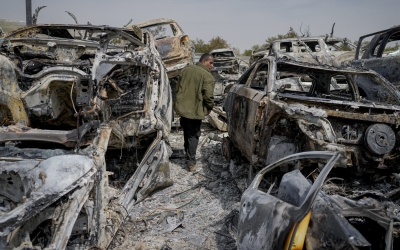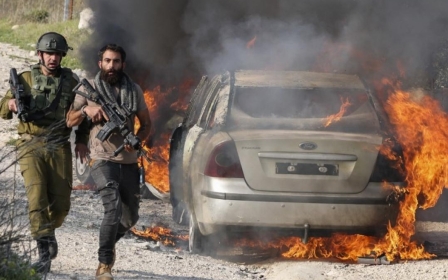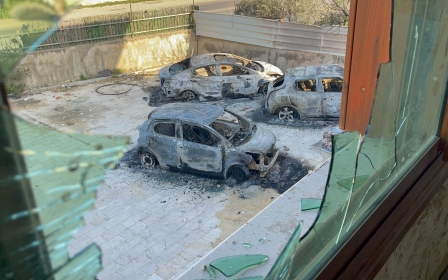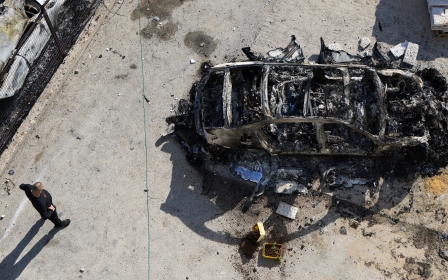Israeli forces raid Palestinian towns as settlers call for 'burning' of Huwwara
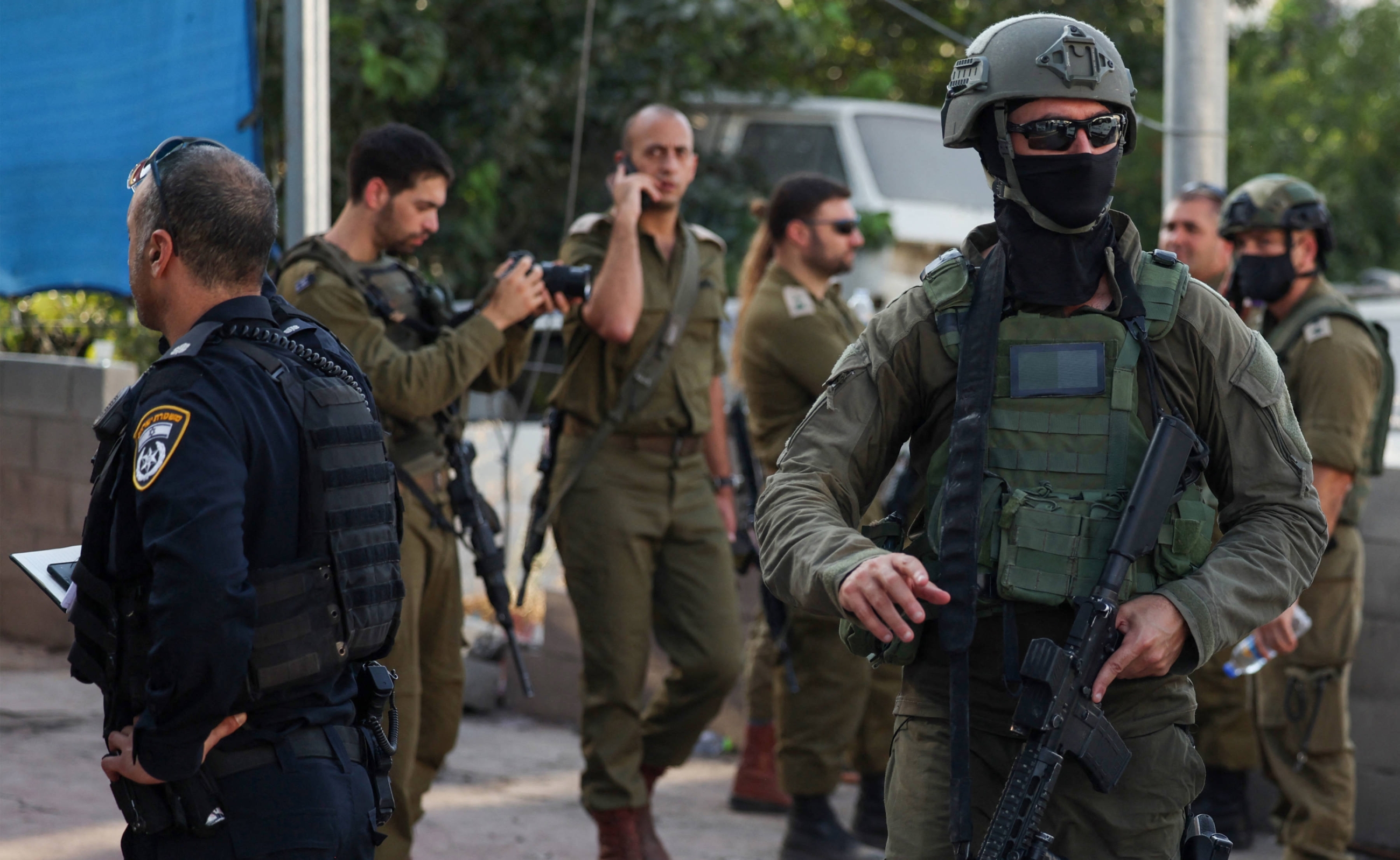
Dozens of Palestinians were wounded on Saturday evening during Israeli military raids of towns south of Nablus, in the occupied West Bank, as part of a search for an assailant who earlier in the day shot and killed two settlers near the town of Huwwara.
Simultaneously, settler groups carried out revenge attacks on Palestinian homes and properties in several towns and villages across the West Bank.
Israeli forces stormed the town of Beita, the closest town to Huwwara south of Nablus, leading to confrontations with Palestinians. The soldiers fired rubber bullets, teargas and sound bombs at residents, wounding more than 100 people, most of whom suffered suffocation from smoke inhalation.
Photojournalist Wahaj Bani Mufleh, from Beita, told Middle East Eye that soldiers fired a teargas canister directly at him, wounding him in the leg, while he was documenting the raid from afar. He was then taken to a medical centre.
"We were covering the raid and deliberately being in a neutral area where there were no Palestinians throwing stones or soldiers firing bombs, but we were surprised when they targeted us with teargas canisters, which resulted in my injury," he said.
New MEE newsletter: Jerusalem Dispatch
Sign up to get the latest insights and analysis on Israel-Palestine, alongside Turkey Unpacked and other MEE newsletters
The Palestine Red Crescent Society said that 112 Palestinians were wounded during the raid on Beita, which lasted for hours, including three who were hit with teargas bombs.
Meanwhile, a family was evacuated from their house after it was targeted by teargas.
Closure of villages
Several other nearby villages and towns were also raided and searched, with their main entrances closed, which resulted in traffic jams, with others caused by military barriers that were erected all around the city of Nablus.
Saad Awwad, head of the Awarta village council, south of Nablus, said barriers surrounding Huwwara had forced Palestinian motorists to take narrow alternative roads to reach their villages, leading to hundreds of Palestinians being stuck in their vehicles from 8pm until 1am.
Several Palestinian families had offered the people stuck in their cars places to sleep in their homes until the checkpoints were reopened.
Awwad said Israeli soldiers had also fired gas bombs in the southern area of Awarta, which led to the burning of a number of trees.
"In addition, the Israeli soldiers closed the road between Awarta and Beita with dirt mounds, which hindered the arrival of eight teachers on the first day of the new school year," he said.
In the nearby town of Aqraba, more than 150 Israeli forces stormed several houses after blowing up their doors. They arrested a 60-year-old Palestinian and his 35-year-old son in one of the house raids.
Salah Khalil, the head of the Aqraba council, said soldiers also blew up the doors of several shops and confiscated surveillance equipment recordings before they withdrew from the town in the early hours of Sunday.
Even after the soldiers pulled out, military vehicles continued to block the road between Aqraba and the nearby town of Yanun, preventing the passage of Palestinians.
"The main objective of setting up barriers and closing the entrances is to separate the villages south of Nablus from one another and to make it difficult for Palestinians to move between them," Khalil said.
Settler Attacks
As the raids were underway, settlers, protected by the Israeli army, launched several attacks on Saturday night and Sunday morning, targeting Palestinian homes and vehicles
The most prominent attacks took place in the vicinity of Nablus, where settlers threw stones at Palestinian vehicles and attacked residential buildings after posting posters urging "Burn down Huwara".
Bashar Eid, a resident of Burin village, south of Nablus, said settlers stoned his house, which had terrified his children.
"We were sitting in the house in the evening when we heard settlers shouting at us, then they threw stones at the house. My little girls started crying, and I tried to calm them down, then I shouted back at the settlers to drive them away," he told MEE.
'We live in a prison, and I can't even go to work for fear that they could attack my family'
- Bashar Eid, resident of Burin
Last year, Eid sustained a bullet wound to his leg when settlers targeted his house during a rampage through several West Bank towns. This time, he said, he stayed inside during the assault on his home, which lasted half-an-hour.
Amid the crying of his children and the settlers' insults, Eid tried to contact the villagers to come and protect his house. The settlers eventually moved away.
"They couldn't break the windows because I'd put up protective nets like those placed on prison windows. We live in a prison, and I can't even go to work for fear that they could attack my family," Eid said.
Settlers also smashed several Palestinians vehicles with stones near the towns of Umm Safa and Beitin in Ramallah, and Palestinian properties were attacked in Masafer Yatta, south of Hebron.
Seperately, the Israeli army shot and wounded a masked Israeli settler, mistaken for being a Palestinian, who had been throwing stones at cars near the village of al-Laban al-Sharqi, south of Nablus, according to Israeli media.
In June, Israeli settlers rampaged through several Palestinian town, torching cars, setting farmland on fire and vandalising homes, following the killing of four Israelis in the West Bank.
In February, similar attacks were made on several Palestinian towns, with homes and property burnt, after two Israelis were killed while driving through Huwwara. At least one Palestinian was killed and nearly 400 wounded in the attacks.
Middle East Eye delivers independent and unrivalled coverage and analysis of the Middle East, North Africa and beyond. To learn more about republishing this content and the associated fees, please fill out this form. More about MEE can be found here.


